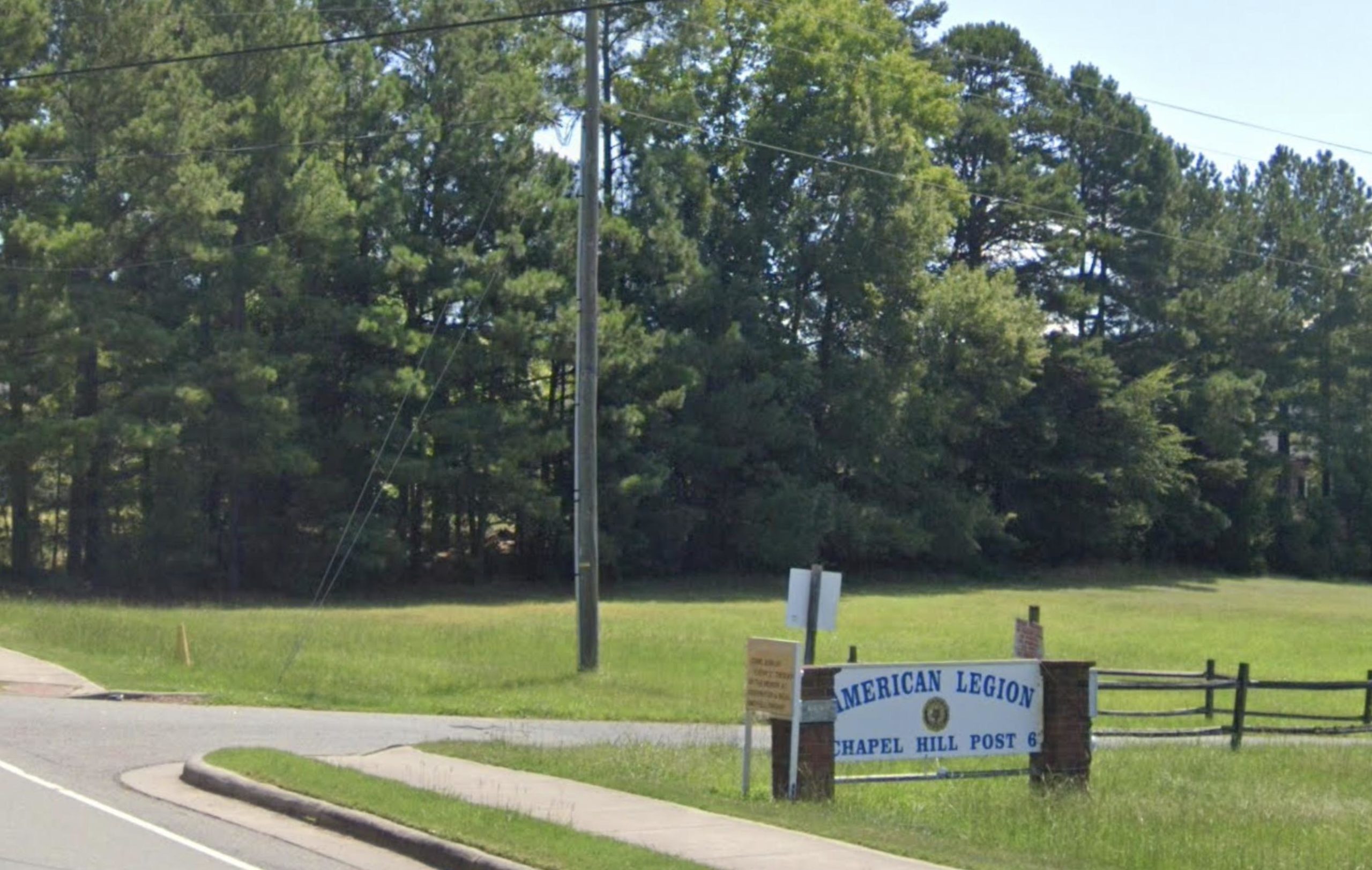There was a moment in the American Legion public meeting last night at the library where someone invited everyone in the room to the American Legion land this morning – it’s Wednesday – to clear wisteria.
Dotty Foley of HOPE NC interrupted him. “We have to go to work to pay the rent,” she said.
The exchange perhaps best encapsulates the entire evening, which featured 40-ish speakers talking about the town’s future plan for the land, which has sat empty for the past six years since the town purchased it for $8 million.
There were a range of speakers last night – one person talked about rainfall, another wanted to make the land into a farm – but most people fell into one of two camps: those who wanted housing and a huge park on the land, and those who wanted the huge park but not the housing.
It struck us that many of the “park and housing” advocates in the room described the town’s plan — a ~40 acre park with 8 acres set aside for affordable housing — as a win-win that took years and years of emotional labor to accomplish. They’re thrilled we’re getting a park, and they’re thrilled we’re getting housing on a small portion of the land. (One of the Hope NC leaders said in their five years of looking at every single possible plot of land in Chapel Hill, this piece of land was the best that they’ve found to provide potential housing.)
We were also struck by how many comments from the “no housing” crowd concerned tone and trust and civility, and how it’s sad how divisive this process has become.
And yet…
Dan Levine, who lives in the Colony Woods neighborhood next to the Legion site and is the co-chair of the Orange County Affordable Housing Coalition, was hiss-booed during his comments, when he said “I also think we have a moral obligation to build affordable housing, and parks. …Do we really need to turn this into a debate of trying to exclude people from our communities, from our backyards?”
We are excluding people now, and that’s not divisive to say – it’s just a fact. Median home prices for Chapel Hill and Carrboro now top $500K. Local rent in Chapel Hill and Carrboro is up 25.6% in the past 15 months (2022 State of the Community Chamber presentation.)
As we heard last night, there are dozens of people in Chapel Hill calling hotlines every week looking for housing they can afford, or that they can stay in affordably. One woman said she recently learned that a majority of the calls to the helpline at our Department of Aging were about housing needs. Another speaker pointed out that we have school teachers commuting from Asheboro, a drive of more than an hour each way.
We acknowledge that neighbors of Legion feel strongly about the property and see their area quickly changing. We, like them, want more greenspaces for our residents.
We disagree, however, that their proximity to Legion should carry more weight in the decision making process than other residents throughout Chapel Hill who have already invested tax dollars in purchasing this property and will be investing much more to make it a world-class park.
We think it is important to consider a wide array of voices on the issue of housing on the Legion property. It is simply unfair to have nearby homeowners – whose home values have steadily increased as a result from Chapel Hill’s exclusionary land use policies – carry more weight than people who have been intentionally excluded from living here.
As we left the meeting, we kept mulling over the words of Jackie Jenks, who leads IFC and sits on the Orange County Affordable Housing Coalition. Jenks made the point that people were sleeping on the streets of Chapel Hill last night and that the shelter was completely full. Instead of talking to the audience, she spoke directly to the Chapel Hill Town Council. This is what she said:
Whenever we’re looking at what to do about a situation, we always go back to what is our mission. And so I looked up a mission for the Town of Chapel Hill, which is learning, serving and working together to build a community where people thrive. I’m really trying to figure out how in this room right now, we are working together to build a community where people thrive. And I think we’re having a hard time with that right now. Because resources are limited.
And we know that we don’t have enough land to do everything that we want to do with it. And so we have to make choices and we have to make decisions. Talking to our council members who are in here, or listening right now, you have very difficult decisions to make all the time. You’re always discussing them, you’re always thinking about them, and you’re always hearing from people about them.
And so I really, really hope that when you are talking about decision making for this, that you are looking at what is the mission of the town, because we all speak for what we want. People who have housing don’t need it. And so it’s easy to say we want a park, it’s easy to say we need more parking spaces.
It’s easy to say all of those things. But you as town council members need to look at the whole community. And so I know you will do that. I have faith in you. And I really appreciate this time people being here to listen tonight. Thank you.
This piece was written by Martin Johnson, Melody Kramer, and Stephen Whitlow.

